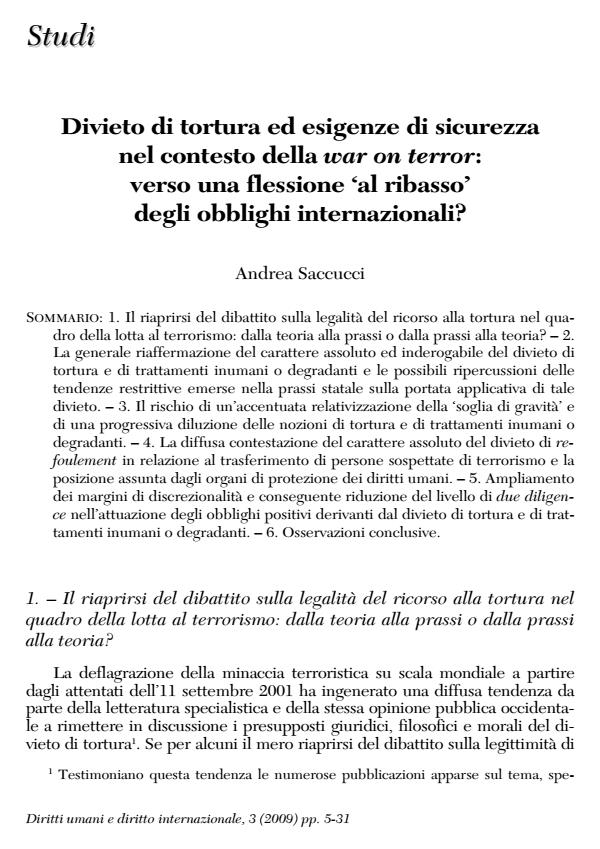Divieto di tortura ed esigenze di sicurezza nel contesto della war on terror: verso una flessione "al ribasso" degli obblighi internazionali?
Journal title DIRITTI UMANI E DIRITTO INTERNAZIONALE
Author/s Andrea Saccucci
Publishing Year 2009 Issue 2009/1
Language Italian Pages 27 P. 5-31 File size 259 KB
DOI 10.3280/DUDI2009-001001
DOI is like a bar code for intellectual property: to have more infomation
click here
Below, you can see the article first page
If you want to buy this article in PDF format, you can do it, following the instructions to buy download credits

FrancoAngeli is member of Publishers International Linking Association, Inc (PILA), a not-for-profit association which run the CrossRef service enabling links to and from online scholarly content.
Prohibition of torture and needs of security in the framework of the war on terror: towards a ‘deflection’ of the international obligations? - The mounting fear brought up by international terrorism and the need to counter effectively threats to national security have re-ignited the legal debate over the absolute nature of the prohibition of torture and inhuman or degrading treatment in situations of extreme danger of massive catastrophes (so called ticking bomb scenario), around the question "Can a suspect terrorist be ever tortured or subject to coercive techniques of interrogations?". After a brief overview of the different answers given by the recent doctrine, an attempt is made to assess whether the post-2001 States’ practice concerning anti-terrorism measures has had (or is capable of having) an impact on the nature and scope of the international norms prohibiting torture and inhuman or degrading treatment. While the absolute and inderogable character of the prohibition continues to be generally recognized at least as a matter of principle, notwithstanding the growing number of reported abuses committed against suspected terrorists, the recent practice shows that States seek to lower the degree of protection afforded by customary and treaty obligations in the name of the war on terror. In this respect, three aspects are examined: a) the general trend to ‘relativize’ the requirement of gravity by means of subjective factors (such as the dangerousness of the person concerned) for the purpose of determining whether certain acts fall within the scope of the prohibition and whether they should be classified as torture or as inhuman or degrading treatment; b) the attempt by many States to challenge the absolute nature of the prohibition of refoulement in case of transfer of the suspect terrorist to a country where there are substantial grounds to believe that he runs a real risk of being subject to prohibited treatment, notably relying on diplomatic assurances; c) a more general tendency to lower the degree of due diligence required of States in the implementation of positive obligations related to the prohibition of torture (such as the obligation to prosecute the perpetrators and to provide adequate reparation to the victims), by broadening the margin of appreciation of national authorities with respect to the aims pursued in the framework of the prevention and repression of terrorism.
Andrea Saccucci, Divieto di tortura ed esigenze di sicurezza nel contesto della war on terror: verso una flessione "al ribasso" degli obblighi internazionali? in "DIRITTI UMANI E DIRITTO INTERNAZIONALE" 1/2009, pp 5-31, DOI: 10.3280/DUDI2009-001001